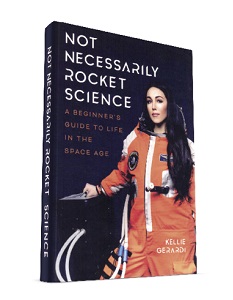The importance of education in science, technology, engineering and mathematics – so-called STEM subjects – is a continual trope for those who seek to attract young people to the space industry and the space community more generally. The author of this little book seeks to prove that the future “doesn’t rest solely on the shoulders of rocket scientists”, citing her own “non-traditional path” as an example.
According to her bio, as a popular science communicator, Kellie Gerardi has “flown multiple microgravity research campaigns as a citizen scientist and space-suited human test subject”. Despite being a “non-engineer”, Gerardi hopes that sharing her own experiences and reflections will spark other people’s “passion for exploration and discovery”. She even named her daughter “Delta V”, presumably to give her a subtle ‘boost’ into that ‘orbit’.
Subtitled “A Beginner’s Guide to Life in the Space Age”, the book takes an increasingly familiar tack for books designed for the Facebook or Instagram generation. It is a mixture of space documentary, autobiography, blog and self-help manual from someone who knows the power of the media and the need to develop communication skills. In some ways, she learned the hard way as a candidate for the ill-founded Mars One one-way mission, following what she thought was a successfully nuanced interview. “When the article came out the following week”, she reports, “my picture appeared under the headline ‘Bride-to-be to dump fiancé for one-way trip to Mars’ and it didn’t get better from there”.
I hope that this book finds its way onto the reading list of many young people, but I fear that its production values will not meet their expectations. Apart from a nicely produced hardback cover with its attractive picture of the author, there are no illustrations and the paper is that coarse and yellowed ‘parchment’ beloved by American academic publishers. Print media may seem old-fashioned to those who live and share their lives on tiny screens, but it has its own abilities to evoke impressions and inspire passions that should not be overlooked.











